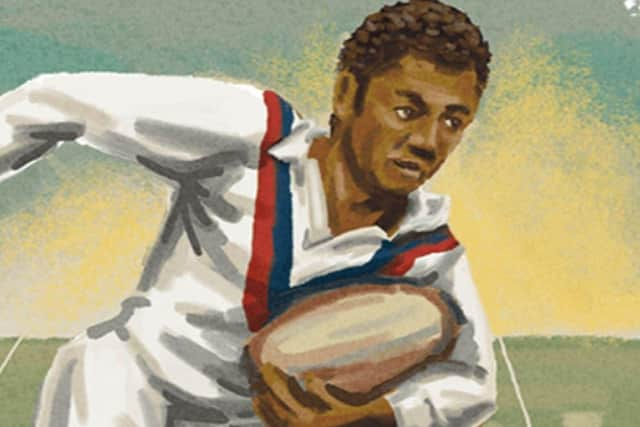Clive Sullivan: who was Welsh rugby league icon, when did he die - and why is a Google Doodle celebrating him?
and live on Freeview channel 276
Google is honouring rugby league legend Clive Sullivan with a Doodle on what would have been his 78th birthday.
The striking illustration depicts the Welsh-born former winger running with a rugby ball down a pitch that reads “Google”.
Advertisement
Hide AdAdvertisement
Hide AdSullivan, who became the first black captain of a major British sports team, led Great Britain to Rugby League World Cup victory in 1972.


So, who was Clive Sullivan - and how did he break down barriers for black rugby players?
Here is everything you need to know about the late rugby star.
Who was Clive Sullivan?
Born in Splott, Cardiff to the only black family in the area, Sullivan became interested in rugby from a young age.
Advertisement
Hide AdAdvertisement
Hide AdDuring his school years he consistently played the sport, sustaining serious injuries that required several surgeries when he was a teenager. Doctors told him he would never walk normally again.
Sullivan then left school and worked as a motor mechanic, before joining the British Army in 1961.
After completing his basic training at Catterick in North Yorkshire, he qualified as a radio operator and then a paratrooper, actively serving with his unit in Cyprus in 1964 before being attached to the United Nations Peacekeeping Force.
Sullivan was awarded the United Nations Medal for his service.
When did he become a professional rugby player?
Advertisement
Hide AdAdvertisement
Hide AdWhile he was training at Catterick, Sullivan was picked for an inter-corps rugby union match.
Despite his injuries, he performed well and decided to progress with the army training in the hope of playing more of the sport.
It paid off, as his talents were spotted during his army matches.
After an unsuccessful trial with Bradford Northern, at the age of 17 Sullivan signed a professional contract with Hull FC - just a day after his trial with the club.
Advertisement
Hide AdAdvertisement
Hide AdHis first three seasons with Hull FC were complicated by army duties and three knee operations, but Sullivan continued to play in league matches until he left the army.
The rugby legend went on to play for the team in more than 350 games, also representing rival team Hull Kingston Rovers on more than 200 occasions, and scoring 368 tries in total for both clubs.
Even though he wasn’t born in Hull, Sullivan became one of the most well-known people in the city and one of the best rugby players it has ever had.
World Cup glory
In 1967, the rugby icon made his international debut for Great Britain, scoring two tries against France.
Advertisement
Hide AdAdvertisement
Hide AdFive years later, he was made captain of the Lions - the first black player to lead a British national team in a major sport - and skippered them to World Cup glory.
During the tournament, Sullivan scored a try in each of his side’s four games, including in the final against Australia.
It remains the last time the Rugby League World Cup was won by a country that was not Australia or New Zealand.
After that, Sullivan coached Hull FC before returning to play again aged 39.
Advertisement
Hide AdAdvertisement
Hide AdIn total, the rugby league star gained 17 caps for Great Britain and 15 for Wales.
When did Clive Sullivan die?
Tragically, Sullivan died of liver cancer aged 42 in 1985 - only six months after he retired.
His funeral saw fans from both rival teams come together to commemorate the sporting legend.
Following his death, the main approach road in Hull was renamed Clive Sullivan Way to commemorate him.
Advertisement
Hide AdAdvertisement
Hide AdAfter Sullivan died, his wife Rosalyn said in Peter Jackson’s Triumph and Tragedy: Welsh Sporting Legends: “He was always very comfortable with his colour. He always said to me that it was an asset because it made him stand out.
“He very quickly identified with the people of Hull. They'd had tough lives, especially the fishermen, and, coming from a humble background himself, he understood that.
“He was loved by everyone in Hull, which was a great tribute to him because there's such fierce rivalry between the two rugby clubs.”
Sullivan also has a trophy named after him, with Hull FC and Hull KR going head-to-head in a derby match for the Clive Sullivan Memorial Trophy since 2001.
The Google bio reads: “Happy birthday, Clive Sullivan. Thank you for breaking barriers and opening doors for generations to come.”